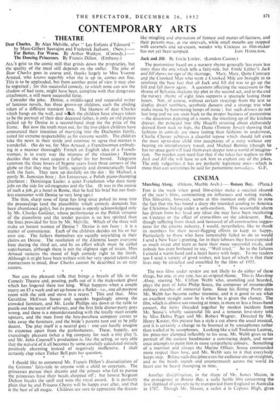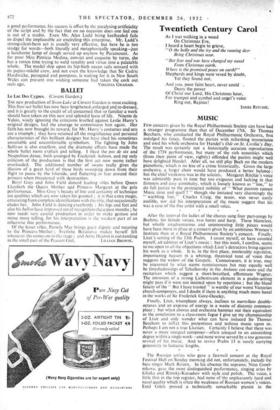CINEMA
Marching Along. (Odeon, Marble Arch.)—Botany Bay. (Plaza.) THIS is the week when good film-critics make a succinct r6sumo of the year's films, commenting on influences and noting trends. This film-critic, however, seems at this moment only able to note the fact that she has found a diary she intended sending to America for Christmas hiding under a sofa-cushion. This seasonable alarm has driven from her head any ideas she may have been incubating on Cocteau or the effect of crime-films on the adolescent. But, though suffering from shock and bereaved of all constructive sugges- tions for the cinema industry, I would, nevertheless, like to thank its members for their never-flagging efforts to keep us happy. Particularly to those who have lamentably failed to do so would I send a New Year's greeting, for in their labours they have expended as much sweat and tears as have their more successful rivals, and nobody has even bothered to say, "Well tried." So to the failures I extend a warm hand and a heart heavy with hope. To my readers too 1 send a variety of good wishes, not least of which is that their. lives may be enriched and ennobled by the films of 1953.
The two films under review are not likely to do either of these things, but one, at any rate, has an original theme. This is Marching Along, starring Mr. Clifton Webb who, unsmiling and bearded, plays the part of John Philip Sousa, the composer of innumerable military marches of immortal fame. Since his Sitting Pretty days Mr. Webb has become rather tiresome, and it is good to see what an excellent straight actor he is when he is given the chance. The film, which is almost too rousing at times, is more or less a brass-band concert, the items threaded together by modest incidents from Mr. Sousa's wholly successful life and a tenuous love-story told by Miss Debra Paget and Mr. Robert Wagner. Directed by Mr. Henry Koster, this picture has a style a cut above the usual musical, and it is certainly a change to be boomed at by sousaphones rather than wailed at by saxophones. Looking like a tall Toulouse Lautrec, his pince-nez clamped inflexibly to his nose, Mr. Webb gives to his portrait of the austere bandmaster a convincing depth, and never once attempts to paint him in more sympathetic colours. Something of a martinet and always the Marine Officer, Sousa commanded more respect than love, and Mr. Webb sees to it that everybody keeps step. Before such discipline even the audience sits up straighter, and as the bands march- and countermarch across the world its heart can be heard thumping in time.
Another disciplinarian, in the shape of Mr. James Mason, is the protagonist in Botany Buy, a sadly feeble film concerning the first shipload of convicts to be transported from England to Australia in 1787. Though Mr. Mason, a sadist a la Captain Bligh, gives a good performance, his success is offset by the paralysing artificiality of the script and by the fact that on no occasion does one feel one is out of a studio. Even Mr. Alan Ladd being keelhauled fails to dispel the implausible air encircling this enterprise. Mr. Ladd's strong-silent-hero act is usually very effective, but here he is too stodgy for words—both literally and metaphorically speaking—just a handsome lump of dough served up anyhow by Paramount. As for poor Miss Patricia Medina, convict and coquette by turns, she has a rotten time trying to weld venality and virtue into a palatable whole. The model ship upon its hip-bath ocean sails onward with its papier-mâché crew, and not even the knowledge that Sir Cedric Hardwicke, peruqued and pompous, is waiting for it in New South Wales can prevent one wishing someone had taken the cork out



























 Previous page
Previous page